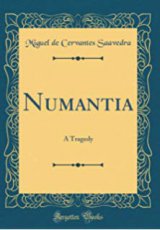The Siege of Numantia Page #23
The Siege of Numantia is a tragedy by Miguel de Cervantes set at the siege of Numantia. The play is divided into four acts. The dialogue is sometimes in tercets and sometimes in redondillas, but for the most part in octaves.
NOTE 12, PAGE 70. Morandro. Bouterwek says: "The transition into light redondillas, for the purpose of interweaving with the serious business of the fable the loves of a young Numantine, named Morandro, and his mistress, is certainly a fault in the composition of the tragedy. But to this fault we are indebted for some of the finest scenes in the drama." We agree with the latter assertion, but not with the former. Neither Nature nor Art forbids the combination; and if love was to be introduced at all into such a play, the redondilla measure, on the Spanish stage at least, was de rigeur. It seems to us that the little ray of sunshine let into the surrounding gloom, and then suddenly extinguished, gives a deeper intensity to the supervening darkness. These love-scenes, moreover, if such they may be called, for they are very saddening, lead up to some of the most tragic scenes of the drama. Ticknor has rendered the whole scene with much spirit, but not in the metre, nor with the simplicity, of the original. We give two short extracts. The first contains the opening stanzas:-- MORANDRO. No vayas tan de corrida, Lira; déjame gozar Del bien que me puede dar En la muerte alegre vida; Deja que miren mis ojos Un rato tu hermosura Pues tanto mi desventura Se entretiene en mis enojos. O dulce Lira, que sueñas Contino en mi fantasía Con tan suave harmonía Que vuelve en gloria mis penas! Qué tienes? Qué estás pensando, Gloria de mi pensamiento? The second extract is the parting scene, which is justly praised for its pathetic tenderness:-- LIRA. Morandro, mi dulce amigo, No vayas; que se me antoja Que de tu sangre veo roja La espada del enemigo. No hagas esta jornada, Morandro, bien de mi vida, Que si es mala la salida Es muy peor la tornada. Si quiero aplacar tu brio, Por testigo pongo al cielo, Que de mi daño recelo Y no del provecho mio. Mas si acaso, amado amigo, Prosigues esta contienda, Lleva este abrazo por prenda De que me llevas contigo. NOTE 13, PAGE 109. I saw within the middle of the square. This fine description of the end of Theogenes, as seen and described by Marius, may fitly wind up our extracts from the original. It is written in very vigorous Tercets, a form of verse in which Cervantes was more expert than in any other:-- En medio de la plaza levantado Está un ardiente fuego temeroso, De sus cuerpos y haciendas sustentado. A tiempo llegué á verle, que el furioso Teogenes, valiente Numantino, De fenecer su vida deseoso, Maldiciendo su corto amargo signo, En medio se arrojaba de la llama Lleno de temerario desatino. Y al arrojarse dijo: O clara fama, Ocupa aqui tus lenguas y tus ojos En esta hazaña que a cantar te llama! Venid, Romanos, ya por los despojos Deste ciudad en polvo y humo envueltos, Y sus floras y frutos en abrojos! NOTE 14, PAGE 112. Viriato. It is a touch of genius, on Cervantes' part, to give this youth, who concentrates at last in his own person all the heroism of his nation, the name of the illustrious Lusitanian hero, Viriatus, the William Wallace of his age and country, who for more than a decade was the terror of the Romans and the pride of his nation, and who, like the Scottish hero, was at last done to death by treachery. END OF THE NOTES.
Translation
Translate and read this book in other languages:
Select another language:
- - Select -
- 简体中文 (Chinese - Simplified)
- 繁體中文 (Chinese - Traditional)
- Español (Spanish)
- Esperanto (Esperanto)
- 日本語 (Japanese)
- Português (Portuguese)
- Deutsch (German)
- العربية (Arabic)
- Français (French)
- Русский (Russian)
- ಕನ್ನಡ (Kannada)
- 한국어 (Korean)
- עברית (Hebrew)
- Gaeilge (Irish)
- Українська (Ukrainian)
- اردو (Urdu)
- Magyar (Hungarian)
- मानक हिन्दी (Hindi)
- Indonesia (Indonesian)
- Italiano (Italian)
- தமிழ் (Tamil)
- Türkçe (Turkish)
- తెలుగు (Telugu)
- ภาษาไทย (Thai)
- Tiếng Việt (Vietnamese)
- Čeština (Czech)
- Polski (Polish)
- Bahasa Indonesia (Indonesian)
- Românește (Romanian)
- Nederlands (Dutch)
- Ελληνικά (Greek)
- Latinum (Latin)
- Svenska (Swedish)
- Dansk (Danish)
- Suomi (Finnish)
- فارسی (Persian)
- ייִדיש (Yiddish)
- հայերեն (Armenian)
- Norsk (Norwegian)
- English (English)
Citation
Use the citation below to add this book to your bibliography:
Style:MLAChicagoAPA
"The Siege of Numantia Books." Literature.com. STANDS4 LLC, 2024. Web. 25 Nov. 2024. <https://www.literature.com/book/the_siege_of_numantia_60>.




Discuss this The Siege of Numantia book with the community:
Report Comment
We're doing our best to make sure our content is useful, accurate and safe.
If by any chance you spot an inappropriate comment while navigating through our website please use this form to let us know, and we'll take care of it shortly.
Attachment
You need to be logged in to favorite.
Log In